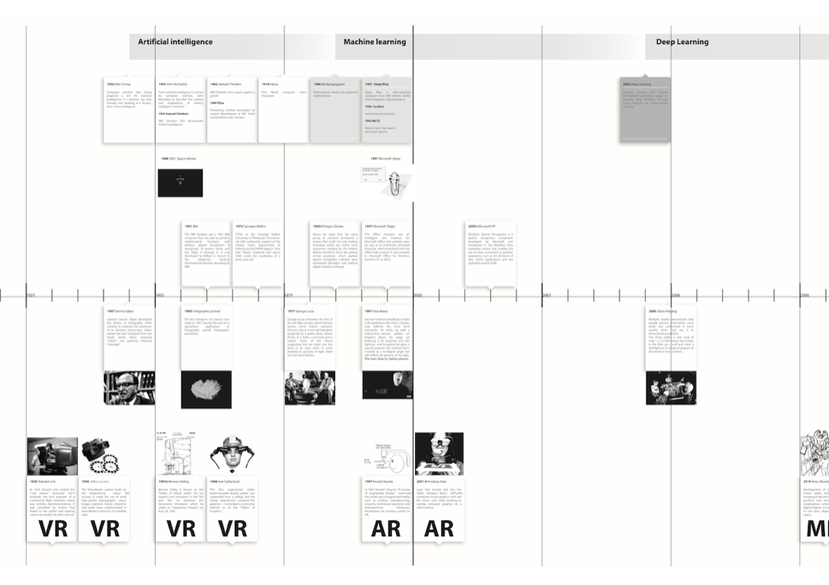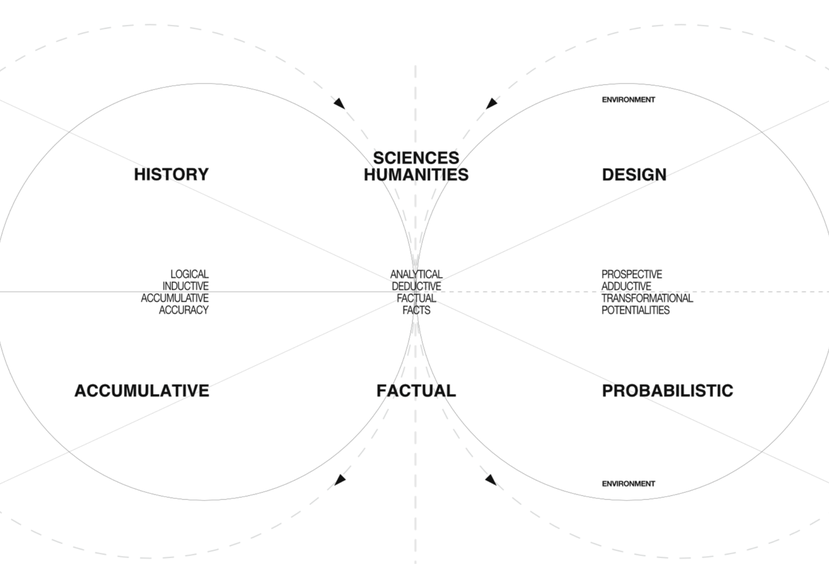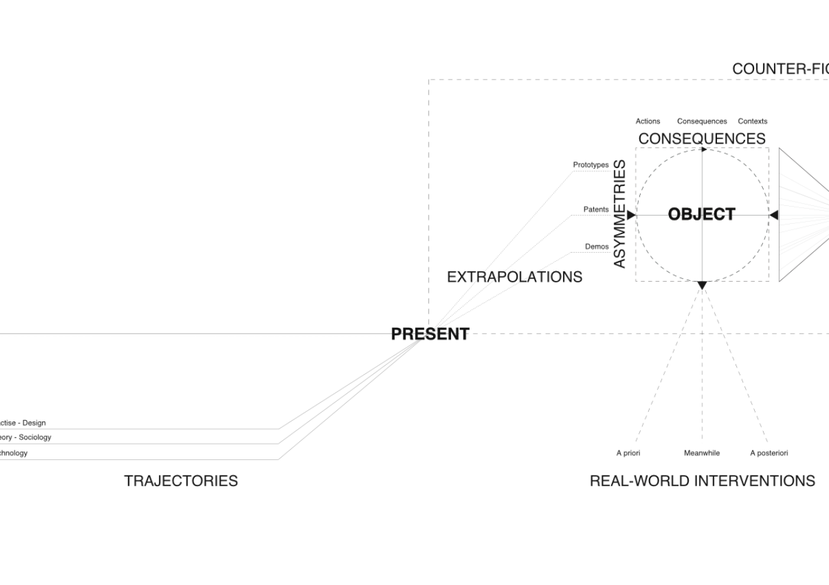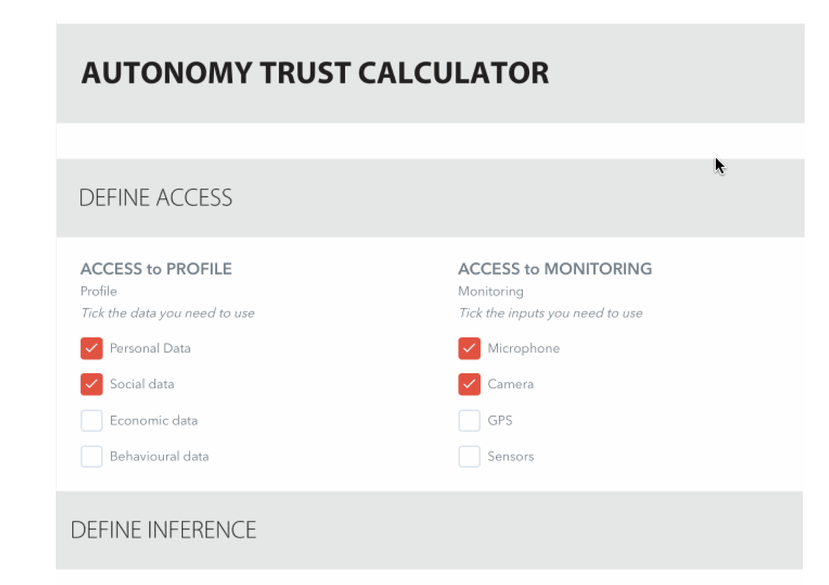
Designing Trust; evolving models and frameworks towards prospective design futures in highly autonomous systems
This PhD explores how trust can be designed in the context of highly autonomous systems (HASs). The case is made that HASs are not simply representations of logical and rational systems with a limited set of pre-programmed supervised tasks on behalf of the user. These systems are largely unsupervised and have the ability to learn and change over time. They can dynamically set their own goals, have the ability to adapt to local conditions via external information (sensors/input) and can potentially evolve in unexpected ways. Such characteristics are crucial for drawing informed conclusions from HASs, and can be addressed through appropriately designed tools and frameworks. This study enables knowledge to apply ethical directionalities to the design of highly autonomous digital systems.
In this process, I discuss that there is a need to develop new ethical frameworks in design to address the main requirements for design in the exponential digital technological age in which we live: preparedness, readiness, and appropriateness. This thesis is interested in applied ethics in large part because we are concerned, even obsessed, with the question of whom we can trust in a world where risk and uncertainty exist. In this context, trust plays a fundamental role as a mechanism to deal with uncertainty and risk. Trust formation is a dynamic process, starting before the user’s first contact with the system and continuing long thereafter. In this context, understanding how contexts, actions, and the unintended consequences that derive from them affect trust is fundamental for the effective design of HASs.
In this thesis, the author proposes Prospective Design as a future-led mixed methodology to mitigate unintended consequences in the context of HASs. This framework combines systems analysis with extrapolations and constructivist perspectives to reconcile confronted models of designing futures. It does so by exploring the context of the future development of virtual assistants (VAs). Although VAs are still in their infancy, they are expected to dominate digital interactions between humans and systems in the coming years. Investigating the prospective developments of this type of interaction device reveals the particular challenges of highly autonomous interactions for scholarly research. In this context, the intersection between the key issues of automation and accountability acts as a focal point. Departing from authored multi-dimensional strategies and modes of calculation in ethical computing that address the raising concerns and impact of HASs in society, this research examines how design decisions affect interactions between humans and systems, how these decisions may be made accessible to practitioners in design frameworks and how Prospective Design strategies are better suited to addressing the emerging concerns regarding these systems. This thesis contributes a new understanding of the ethical implications of designing HASs and provides the practical and conceptual means for making this knowledge accessible and usable to designers.
Key details
School, Centre or Area
Area of expertise
Supervisors
Gallery
More about Fernando
Biography
Fernando's design practice experiments with the use of design, art, sociology, science and technology as mediums to reconfigure processes and systems of production to question the social, cultural, ethical and political context in which they operate.
His MSc in Cognitive Computing researched emotional pattern recognition through EEG sensor-dry technology to foresee the relationships between emotions and memory. This work led to an AHRC studentship award to further his expertise on the intersection of neuroscience and design. His MRes focused on redefining the use of Neuroscience in design practice from a socially interactive perspective. It addressed the ethical implications for society of accessing subconscious information and proposed, through practice, technological implementation focused on improving well-being, social interaction and self-knowledge (neuro-ethnography). In the process, it set up the foundations for the humanities to integrate neuroscience in design practice.
Furthering his investigations into digital systems, he has completed a doctoral programme in Global Innovation Design at the RCA, where he investigated trust design at the intersection of artificial intelligence, ethics, and society. As part of his research, he has developed novel methodologies in design practice, such as Prospective Design. This future-led, mixed-methods incorporate trajectories, probabilistic extrapolation, asymmetries, consequential analysis and counter-fictions to design novel strategies to mitigate unintended consequences in prospective technological developments. In this process, he experimented with notions of synthetic morality by developing multi-dimensional strategies such as Synthetic Consequential Reasoning, and alternative forms of moral calculations. This bottom-up approach was combined with top-down strategies such as the articulation of a new digital right, ‘the right to reparation’, to ensure that emerging Highly Autonomous Systems (HAS) interactions remain accountable while the development of these technologies cannot fully guarantee its output by the impossibility of fully monitoring its actions in real-time.
All these developments are contributing to the integration of applied ethics in design practise. This research has been published and presented internationally at conferences at MIT, The University of Cambridge, The University of Manchester, The Royal College of Art, the University of Côte d’Azur, UNISINOS Brazil, CHUV Lausanne, or the Design Museum in London.
Further areas of interest are design theory, and sustainability. In the former, he has made significant contributions to design theory by redefining the ontological nature of design. This research advances knowledge by making a fundamental contribution to the contextualisation of Glanville’s concept of “knowledge for’” transforming the future as a posteriori and probabilistic knowledge ontology. In the latest, he has published a new framework on Object-Oriented-Upcycling to develop an object based approach to the circular economy.
Degrees
BA Product Design, London Metropolitan University
MSc Cognitive Computing, Goldsmiths College, University of London
MRes Design, Goldsmiths College, University of London
Awards
AHRC Studentship
Exhibitions
London Design Biennale, The bioNet of Species, 2021
Intentions: Conversations, Experiences and Knowledge, 2017
Goldsmiths Computational Studio Arts, London, 2013
Tilt, Hoxton gallery, London, 2013
Publications
Papers
Galdon, F., Hall, A. (2021). (Un)Frayling design research in design education for the 21Cth. The 14th EAD Conference; Safe harbours, Lancaster, UK, 11-16 Oct 2021.
Galdon, F., Hall, A, Ferrarello, L. (2021). Enhancing abductive reasoning in design and engineering education via probabilistic knowledge: a case study in AI. International conference on engineering and product design education.
Ferrarello, L, Rute, P.C.F, Hall, A, Galdon, F, Anderson, P, Grinyer, C, Stevens, J, Lee, C,H. (2021). Learning Remotely through Diversity and Social Awareness. The Grand Challenge approach to tackle societal issues through diversity and creative thinking, LearnxDesign.
Rodgers, P., Galdon, F., Bremner, C. (2020). Design Research-in-the-Moment: Eliciting Evolutive Traces during the Covid-19 Crisis. Design Research Journal 13(3):18 Follow journal
Galdon, F., Hall, A, Ferrarello, L. (2020). Futuring and trust; A prospective approach to designing trusted futures via a comparative study among design future models. Design Culture Symposium (DCS)
Galdon, F., Hall, A, Ferrarello, L. (2020). Futuring and trust; A prospective approach to designing trusted futures via a comparative study among design future models. Design Research Journal
Galdon, F., Bertelsen, S. E. Jeremy Hulse, J., Hall, A, (2020). Object-Oriented-Upcycling: An object-based approach to the circular economy. Conference Paper. International Upcycling Symposium 2020 Research and Practice
Galdon, F., Hall, A. (2020). The right to reparations: a new digital right for repairing trust in the emerging era of highly autonomous systems. Proceedings of the 2nd International Conference on Human Interaction and Emerging Technologies: Future Applications (IHIET-AI 2020) Lausanne, Switzerland.
Galdon, F., Hall, A. (2020). Synthetic Consequential Reasoning: Facilitating the design of synthetic morality in highly automated systems via a multidimensional-scalar framework. Proceedings of the 2nd International Conference on Human Interaction and Emerging Technologies: Future Applications (IHIET-AI 2020) Lausanne, Switzerland.
Galdon, F., Hall, A., & Ferrarello, L. (2020). Designing trust in Artificial Intelligence: A comparative study among specifications, principles and levels of control. Proceedings of the 2nd International Conference on Human Interaction and Emerging Technologies: Future Applications (IHIET-AI 2020) Lausanne, Switzerland.
Galdon, F., Hall, A. & Wang, S. J. (2019). Prospective design: A future-led mixed-methodology to mitigate unintended consequences. Proceedings of the International Association of Societies of Design Research Conference IASDR2019, The University of Manchester, UK.
Galdon, F., & Wang, S. J. (2019). From apology to compensation; A multi-level taxonomy of trust reparation for highly automated virtual assistants. Proceedings of the 1st International Conference on Human Interaction and Emerging Technologies (IHIET 2019) conference August 22-24, 2019, Nice, France.
Galdon, F., & Wang, S. J. (2019). Addressing accountability in highly autonomous virtual assistants. Proceedings of the 1st International Conference on Human Interaction and Emerging Technologies (IHIET 2019) conference August 22-24, 2019, Nice, France.
Galdon, F., & Wang, S. J. (2019). Optimizing user engagement in highly automated virtual assistants to improve energy management and consumption. Proceedings of the Applied Energy Symposium, MIT Media Lab, 22-24 May 2019.
Galdon, F., & Wang, S. J. (2019). Future development of AI Virtual Assistants (VAs) in Energy management and consumption. Proceedings of the Applied Energy Symposium, MIT Media Lab, 22-24 May 2019.
Chapters
Rodgers, P. A., Bremner, C., Galdon, F. (2022). The Usefulness of Imperfect Design. In: Design and Covid-19: From Reaction to ResiliencePublisher: Bloomsbury Publishers, London.
Galdon, F., Hall, A. (2019). The ontological nature of design; prospecting new futures through probabilistic knowledge. Design Research for Change Symposium. Design Museum, London. ISBN 978-1-86220-369-3
Galdon, F., & Wang, S. J. (2019). Designing trust in highly automated virtual assistants: A taxonomy of levels of autonomy. Artificial Intelligence in Industry 4.0: A collection of innovative research case-studies. International Conference on Industry 4.0 and Artificial Intelligence Technologies IAIT. Cambridge, UK.
Books
Rodgers, P., Galdon, F., Bremner, C. (2020). A Design History of the Covid-19 Virus. Publisher: Lancaster University. ISBN: 978-1-86220-390-7
Cases
Craft, B., & Dare, E. (2012). Physical Computing, Handcranked Press, August 2012. Publication by project: Digital Brownie by Fernando Galdon and Catherine M. Weir.
McConnon, N. et al., (2013). Digital Revolution. Eds. Barbican International Enterprises, London. Publication by project: Digital Brownie by Fernando Galdon and Catherine M. Weir.
Conferences
(2021) The 14th EuropeanDesign Academy conference; Safe harbours EAD2021
(2021) The International conference on engineering and product design education, University in Herning, Denmark.
(2021) DLX design lab - COVID-19 research, Tokyo, JP
(2020) The Design Culture Symposium (DCS) at UNISINOS, BR.
(2020) The 2nd International Conference on Human Interaction and Emerging Technologies: Future Applications (IHIET-AI 2020) Lausanne, Switzerland.
(2020) The International Upcycling Symposium 2020 Research and Practice at De Montfort University, Leicester, UK
(2019) Design Research for Change Symposium. Design Museum, London, UK.
(2019) The International Conference on Industry 4.0 and Artificial Intelligence Technologies. The University of Cambridge, UK.
(2019) The 1st International Conference on Human Interaction and Emerging Technologies, The University of Côte d'Azur, Nice, FR.
(2019) Applied Energy Symposium AEAB2019, Massachusetts Institute of Technology (MIT), Boston, USA.
(2019) The International Association of Societies of Design Research Conference IASDR2019, The University of Manchester, UK.



